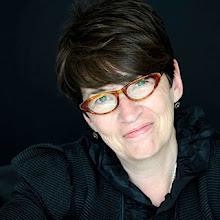Last night at the University of Brighton we had the good fortune to see the Beyond Biba film and be part of a conversation between Molly Parkin and Barbara Hulanicki.
What a great night - the two friends were nostalgically remembering their youth and the wonderfully creative times of the changing fashion world of the 1960's.
Its a great shame that the licensing deal that Barbara signed means that investors own the brand name. Biba re-surfaces now and again with new companies buying the rights to use the brand name. A lady in the audience had designed a dress for Biba two years ago when the brand was relaunched, however the brand didn't survive without its heritage and the integrity of Barbara Hulanicki's vision and innovation.
Its hard to divorce a brand name from the intangible brand values associated with the original entrepreneur. Biba was about a lifestyle concept - a new way of life for young people. The brand design was dark, moody and evoked an atmosphere of the bordello. Barbara Hulanicki's illustrations, clothing designs, interior design and visual merchandising made the Biba brand a unique iconic experience.
Friday 30 October 2009
Thursday 29 October 2009
Fashion Textiles - a talk by David Radcliffe
Last night David Radcliffe gave a fascinating talk to the Creative Fashion Forum about our textile industry and how historically the UK producers sold its patents for various fibres such as Terylene, Crimplene and Bri-Nylon to Japan as we failed to invest in our textile innovations.
Something I had forgotten is how expensive dry cleaning is here in the UK and this of course put pressure on the industry to invent washable fabrics - those that didn't have to be ironed.
David also explained how Japan sold all the fabrics they made plus the machinery to Taiwaan and Korea - in effect selling its expertise and creating a competitor market. Trading houses like Mitsubishi sold everything from cars to cloth in those days seeing all products as commodities.
Since the 1980's the fashion industry has chased price so countries in Europe and the Far East have competed on providing low cost textiles and manufacturing. David provided a fascinating table about the different qualities suppliers compete on such as speed of production, ethical standards, expertise, communication etc and how different countries rated against these factors. Its not always price that wins the order.
We learnt about weaves like Jacquard and Crepe and discussed the qualities of various blends and mixes. David explained the art of being a silk mother and the nurturing silk worms need to make the best quality fabric.
Many of the designers present were eager to gain advice from David about his expertise and contacts for sourcing suppliers. We discussed the challenges for small designers looking for small quantities of fabric. The best piece of advice was to source the fabric and maker in the same country. There is more skill in making textiles than machining and this helps reduce our carbon footprint.
Subscribe to:
Posts (Atom)

